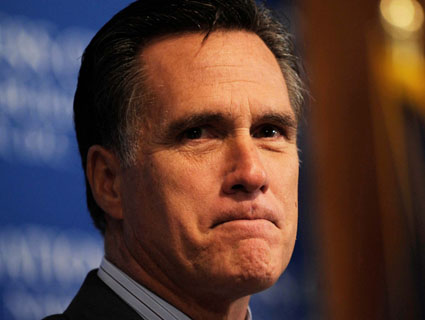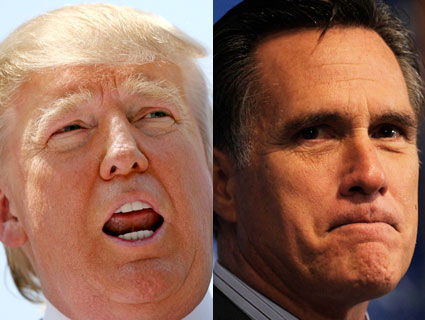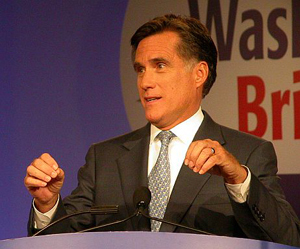
Christy Bowe/Globe Photos/ZUMApress.com
In the 2012 presidential race, New Hampshire’s first-in-the-nation primary is make-or-break for Mitt Romney, and to win it, Romney’s campaign will need the savviest operatives it can find. But Team Romney will have to go without one key player: Bruce Keough. The New Hampshire Republican who oversaw Romney’s 2008 campaign in the Granite State says he’s no longer sure what Romney stands for.
In an interview with Mother Jones, Keough, a businessman, says he declined an offer join Romney’s 2012 effort and instead is sizing up other potential candidates, including Indiana governor Mitch Daniels and former Minnesota governor Tim Pawlenty. A former gubernatorial candidate in New Hampshire, Keough says Romney’s wishy-washy political identity and inability to stake out firm, consistent positions as a candidate were the reasons for his decision to cut ties with Romney. “He struggled with that in the last campaign,” Keough explains, “and to some extent I think he’s still struggling with it.”
Keough isn’t the only one who thinks Romney has an identity problem. In early March, the former Massachusetts governor gave a major speech at a Lincoln Day dinner in New Hampshire. His performance was later dubbed “Romney 3.0.” The first version, or Romney 1.0, was the candidate who successfully ran for governor in 2002 as a social moderate who touted his business acumen. Then, in the 2008 presidential race, Romney moved to the right, especially on hot-button social issues like abortion and stem cell research. That was Romney 2.0. And finally there’s Romney 3.0, the latest iteration, a business-centric candidate willing to lose the necktie and hang out at NASCAR races.
It’s this ever-changing persona that soured Keough on Romney. “I don’t think the voters are looking for somebody who’s going to be recasting himself,” he says. “They want somebody who’s been true to a certain set of political ideals for a while.” Which isn’t to say that Keough completely disagrees with Romney. He tempers his criticism by saying Romney “has been strong at times” and has “a lot of assets as a candidate.” Still, Keough adds, Romney “manages to say things that cause people to think, ‘Wait a second: I thought I knew him, and now I’m not so sure.’ I think he can be successful. But I don’t think he will be successful if he runs his campaign like he did in 2008.” (Romney’s exploratory committee did not respond to a request for comment.)
Romney finished second in the New Hampshire GOP primary in 2008. One problem with that campaign—and a reason for Romney’s flimsy identity—was the former Massachusetts governor’s decision to surround himself with an array of advisers who often had conflicting opinions on what Romney’s strategy should be, Keough says. Romney had multiple high-level campaign strategists and a coterie of media consultants offering up their advice to the candidate as the campaign rolled on, which made it more difficult for Romney to articulate a clear and consistent message to voters. “I think his last campaign was plagued by too many cooks in the kitchen,” Keough says.
Democrats have also bashed Romney for his flip-flopping. When Romney announced his 2012 presidential exploratory committee earlier this month, the first step toward officially entering the race, New Hampshire Democratic Party chair Ray Buckley responded by saying, “The truth is, the people of New Hampshire may never know who the real Mitt Romney is, because it’s not at all clear that he does. Mitt Romney just wants to be President—plain and simple—and he’ll take any position or say anything to get there.”
Some who’ve worked for Romney in New Hampshire disagree with Keough’s criticism. Donna Sytek, a former state legislator who worked for Romney 2008 and will rejoin Romney’s 2012 New Hampshire campaign, says Romney is merely reacting to what voters in New Hampshire and elsewhere want. “Aren’t we allowed to evolve on the issues?” she asks. “You emphasize different things depending on what the nation needs.”
Early indicators for New Hampshire’s first-in-the-nation primary in 2012 show Romney with considerable support. He won the 2012 cycle’s first presidential straw poll, taken in New Hampshire, and a recent Dartmouth survey showed Romney beating Obama in New Hampshire, 47 percent to 39 percent. But all the news out of New Hampshire hasn’t been so cheery. On Friday, the state Democratic Party filed a complaint with the Federal Election Commission alleging that Romney violated federal law by diverting “soft money” donations to his state political action committees into his federal presidential campaign. “Credible evidence suggests laws may have been broken,” the complaint reads. (A Romney official dismissed the allegations as politically motivated.)
Dean Spiliotes, a veteran political analyst who runs NHPoliticalCapital.com, says Romney’s flip-flopping has been a problem for nearly as long as he’s been in politics. And while Romney enjoys strong backing in New Hampshire, Spiliotes says that Keough’s criticisms will certainly reverberate throughout Republican politics in the Granite State. “If somebody like Keough said that to the campaign,” he says, “it’s going to be very interesting to see how that plays out up here.”








